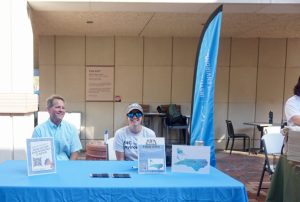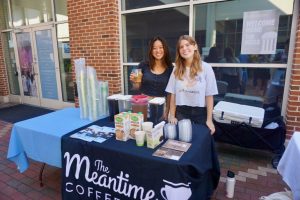Story by Dylan Gentner, a student in UNC Hussman School of Journalism and Media
On a Wednesday morning in September, Sustainable Carolina hosted its second annual Sustainability Social in the Franklin Porter Graham Student Union Gift Plaza. Last year, over 20 University of North Carolina at Chapel Hill research departments, student organizations and related groups attended. This year’s showing was comparable.
“We’re lucky to have student organizations and departments working across a variety of sustainability issues, from food to renewables to conservation,” said Abigail Brewer, the communications and engagement specialist for Sustainable Carolina. “All of this is represented here at the social.”
Sustainability in the University Community
At one table was Citizens’ Climate Lobby, a non-partisan grassroots advocacy organization that combats climate change through national policy. Clean Tech, at a neighboring table, hosts an annual conference. At Sustainable Carolina’s table, representatives shared information on the UNC-Chapel Hill Climate Action Plan and the University’s goals to reach net-zero greenhouse gas emissions by 2040.
The UNC-Chapel Hill Climate Action Plan is only one facet of Carolina’s commitment to the environment, as Sustainable Carolina, a subset of the UNC Institute for the Environment, spearheads efforts to revamp anything from buildings to dining hall food. Each year, it releases a sustainability report on greenhouse gas emissions data of campus operations and hosts events like this one to make its findings and efforts more visible to the student body.
“Everything we do, even my data work, is about education and outreach,” said Melanie Elliott, Sustainable Carolina’s sustainability analyst. Published findings have to be digestible for the average person on campus, which means more leg work for her as she translates spreadsheeted data into understandable terms.
When she isn’t gathering information on greenhouse gas emissions, she’s working on her current project: creating a more informative sustainability tour of campus, one that focuses on more than just buildings.
Strength in Student Organizations
As essential as structural changes are to the mission of sustainability, there are plenty of opportunities for students to engage with environmental activism and organizations on campus. Events like the Sustainability Social bring life to the spreadsheets Elliott creates and put boots on the ground for plans that the Sustainable Carolina team makes.
Carolina Thrift, seated at a middle table, narrows in on individual intentional consumerism and had their annual Bell Tower Thrift event the weekend before classes began. CompostMates offers driving services that pick up compost from homes in Chapel Hill and Carrboro, and the UNC Office of Waste Reduction and Recycling, a few tables down, aims to educate people on campus on what is and isn’t recyclable.
The Sustainable Business Club was created by a senior business student who lamented the lack of opportunities for students to do meaningful interning and starter jobs. It offers opportunities to work with local and international organizations that need students with understanding of environmental issues and business practices. Solar Equity, also student-created and student-led, partners with Habitat for Humanity to revolutionize access to solar energy by implementing it in lower-income communities.
The Meantime Coffee Company, a campus favorite, also tabled at the social. The representative there told attendees about Meantime’s “bring your own mug” policy, compostable cups and commitment to community and social justice.
“We try to focus on triple bottom line sustainability, which is economic, environmental and social ways of being sustainable,” said Eugenia Chow, a barista and senior majoring in public policy, sustainability studies and global development. The coffee shop pays livable wages, ensures its café is accessible and educates its baristas in DEI principles.
Starting last spring, Chow said, Meantime began collaborating with other environment-conscious organizations on campus to create a drink menu that supports various causes. Right now, part of the money brought in by the seasonal Compost Maple Latte goes to support the work of CompostMates.
“We try to connect everyone so that we aren’t each working in silos,” Brewer said of the importance of collaboration and connection between environmental clubs and groups.
The Sustainability Social is just one way the Carolina community gets to see how other students, staff and community members are creating change at both grassroots and institutional levels.



